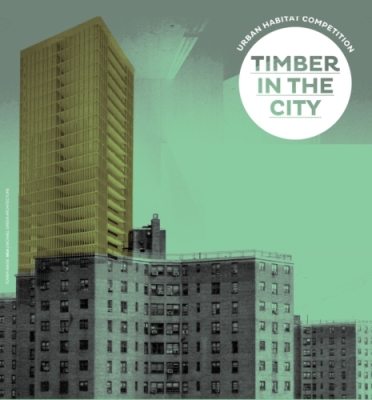Oct 18 2012
Wood has been used as a building material for thousands of years, but when it comes to urban construction, American cities are predominantly steel and concrete. A new design competition, organized by the Association of Collegiate Schools of Architecture (ACSA), the Binational Softwood Lumber Council (BSLC), and Parsons The New School for Design seeks to change that mindset.
 Timber in the City: Urban Habitats Competition challenges architecture students and young professionals, working individually or in teams, to design a mid-rise, mixed-use complex for a site in the Brooklyn waterfront neighborhood of Red Hook. (PRNewsFoto/Association of Collegiate Schools of Architecture/Binational Softwood Lumber Council/Parsons The New School for Design)
Timber in the City: Urban Habitats Competition challenges architecture students and young professionals, working individually or in teams, to design a mid-rise, mixed-use complex for a site in the Brooklyn waterfront neighborhood of Red Hook. (PRNewsFoto/Association of Collegiate Schools of Architecture/Binational Softwood Lumber Council/Parsons The New School for Design)
Timber in the City: Urban Habitats challenges architecture students and young professionals, working individually or in teams, to design a mid-rise, mixed-use complex for a site in the Brooklyn waterfront neighborhood of Red Hook, an industrial and residential area that is currently in flux, with a population of public housing residents and working artists and designers, and a number of new residential and commercial developments such as Ikea. With a focus on regenerating the urban manufacturing sector and addressing New York's housing needs, entrants are being tasked with incorporating affordable housing units; a bike sharing and repair shop; as well as a vocational, manufacturing and distribution center for the innovative use of wood technology.
"Timber is ideal for green building – it has a lower overall environmental and carbon footprint than other materials and is renewable," said Cees de Jager, executive director of BSLC. "Wood is well suited for a broad range of structural and aesthetic applications, is high performance, and, in many cases, is a more economical choice."
Innovations in wood technologies are offering new opportunities for large-scale construction in this sustainable material. From long-span laminated beams to cross-laminated timber panels, wood has proven to be a safe and durable for urban settings. These systems are already being used in major cities around the world, from Europe to Australia and Canada. This includes such highly acclaimed projects as architect Andrew Waugh's Murray Grove in North London, the world's tallest residential building made of cross-laminated timber panels.
Entrants will be challenged to propose construction systems that draw optimally on the performance characteristics of a variety of wood technologies, and incorporate the creative and innovative use of wood in its design. A distinguished panel of judges will award the winning teams with cash prizes totaling $30,000, and the projects will be publicly exhibited at the 2014 ACSA Annual Meeting in Miami and the American Institute of Architects 2014 Convention in Chicago.
"At Parsons, our students and faculty have seen firsthand how wood can serve as an ideal green building material in an urban setting," said Andrew Bernheimer, director of the Master of Architecture program at Parsons. "It has become clear to us that wood is not only environmentally friendly, but also affordable, through recent design-build projects such as Empowerhouse, our entry into the Solar Decathlon, which won the affordability category and is now being constructed by Habitat for Humanity of Washington, D.C."
Entrants must register by March 6, 2013 and submit their project by May 22, 2013. The design jury will meet July 2013 to select winning projects and honorable mentions. For full details on the competition visit the ACSA website.